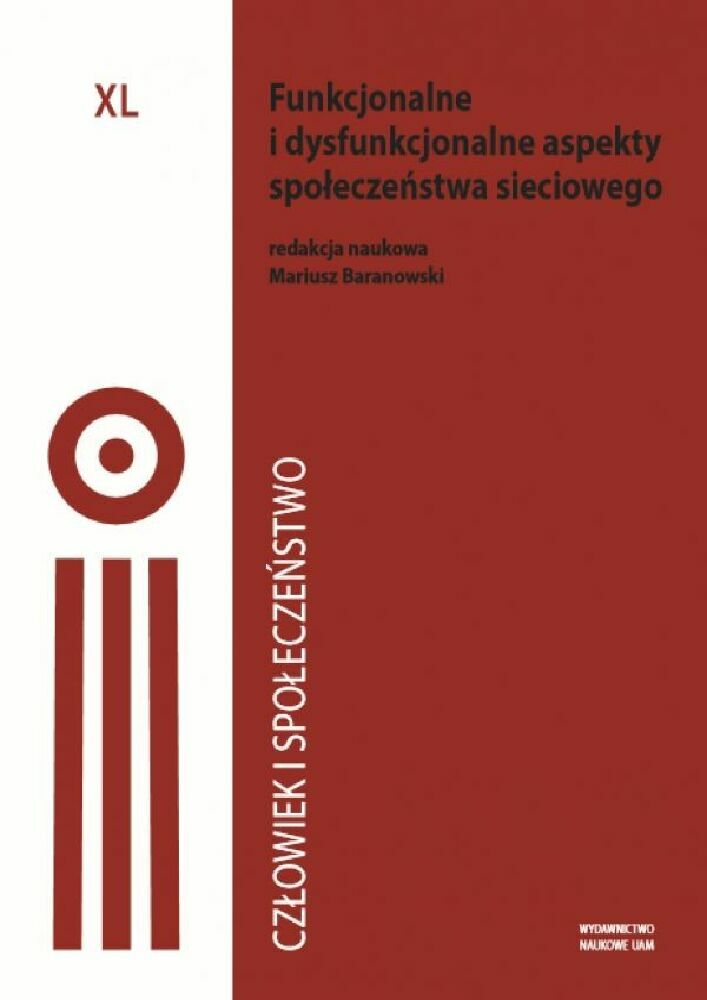Abstrakt
The article presents the relationship between the Internet, the state and politics. It starts from describing similarities between politics and social aspects of the Internet. This is described in the context of Web 2.0, collective intelligence, informal circuits of cultural content and multitasking. Then two perspectives of the functioning of the Internet in the contemporary state and politics are shown. The first, which is a top-down perspective, describes the concepts of e-government and e-participation. The second one, which is bottom-up, refers to new types of election campaigns as well as the role of new media in social change. In conclusion, there are some questions regarding cyberdemocracy and digital citizenship.
Bibliografia
Anstead N., Chadwick A., Parties, election campaigning, and the internet. Toward a comparative institutional approach, w: A. Chadwick, P.N. Howard (red.), Routledge Handbook of Internet Politics, London – New York 2009.
Bakardijeva M., Virtual togetherness: An everyday-life perspective, „Media, Culture & Society” 25/2003.
Bard A., Soderqvist J., Netokracja. Nowa elita władzy i życie po kapitalizmie, Warszawa 2006.
Batorski D., Drabek M., Gałązka M., Zbierniak J. (red.), Wyborca 2.0, Warszawa 2012.
Bendyk E., Bunt sieci, Warszawa 2012.
Castells M., Sieci oburzenia i nadziei. Ruchy społeczne w erze internetu, Warszawa 2013.
Castells M., Władza komunikacji, Warszawa 2013.
Davis R., Baumgartner J.C., Francia P.L., Morris J.S., The internet in U.S. election campaigns, w: A. Chadwick, P.N. Howard (red.), Routledge Handbook of Internet Politics, London – New York 2009.
Dijck J. van, Users like you? Theorizing agency in user-generated content, „Media, Culture & Society” 31 (1)/2009.
Elektroniczna Platforma Usług Administracji Publicznej, http://epuap.gov.pl [2.07.2014].
Filiciak M., Hofmokl J., Tarkowski A., Obiegi kultury. Społeczna cyrkulacja treści, Warszawa 2012, http://obiegikultury.centrumcyfrowe.pl/ [2.07.2014].
Garlicki J., Kultura polityczna polskich internautów, „Studia Politologiczne” 21/2011.
Gehl R.W., The archive and the processor: The internal logic of Web 2.0, „New Media & Society” 13 (8)/2011.
Kavanaugh A., Perez-Quinones M.A., Tedesco J.C., Sanders W., Toward a Virtual Town Square in the Era Of Web 2.0, w: J. Hunsinger, L. Klastrup, M. Allens (red.), International Handbook of Internet Research, Dordrecht – Heidelberg – London – New York 2010.
Keen A., Kult amatora. Jak internet niszczy kulturę, Warszawa 2007.
Kulesza J., Ius internet. Między prawem a etyką, Warszawa 2010.
Lévy P., Collective Inteligence. Mankind’s Emerging World in Cyberspace, Cambridge 1999.
Morozow E., The Net Delusion. The Dark Side of Internet Freedom, New York 2011.
Mossberger K., Tolbert J.C., McNeal Ramona R., Digital Citizenship. The Internet, Society, and Participation, Cambridge – London 2008.
Mossberger K., Toward digital citizenship. Addressing inequality in the information age, w: A. Chadwick, P.N. Howard (red.), Routledge Handbook of Internet Politics, London – New York 2009.
Mouffe Ch., Paradoks demokracji, Wrocław 2005.
Reedy J., Wells C., Information, the internet, and direct democracy, w: A. Chadwick, P.N. Howard (red.), Routledge Handbook of Internet Politics, London – New York 2009.
Stromer-Galley J., Wichowski A., Political Discussion Online, w: M. Consalvo, C. Ess (red.), The Handbook of Internet Studies, Chichester 2011.
Tyner C.R., Literacy in a Digital World. Teaching and Learning in the Age of Information, Mahwah 1998.
Ułatwienia w głosowaniu – wiedza, opinie, oczekiwania. Komunikat z badań CBOS, kwiecień 2014, http://www.cbos.pl/SPISKOM.POL/2014/K_055_14.PDF [3.07.2014].
United Nations E-Government Survey 2014, http://unpan3.un.org/egovkb/en-us/Reports/UN-E-Government-Survey-2014 [16.06.2015].
Ward S., Gibson R., European political organizations and the internet. Mobilization, participation, and change, w: A. Chadwick, P.N. Howard (red.), Routledge Handbook of Internet Politics, London – New York 2009.
Wheeler D.L., Does the Internet Empower? A Look at the Internet and International Development, w: M. Consalvo, C. Ess (red.), The Handbook of Internet Studies, Chichester 2011.
Winston B., Media, Technology and Society. A History: From the Telegraph to the Internet, London – New York 2003.
Licencja
1. W momencie złożenia pracy celem rozpoczęcia postępowania w sprawie publikacji, Licencjodawca, zwany dalej Autorem, akceptuje wszystkie zasady umieszczone na stronie internetowej czasopisma “Człowiek i Społeczeństwo”, udzielając Licencjobiorcy, zwanego dalej Wydawcą, niewyłącznej i nieodpłatnej licencji na korzystanie z Utworu. Licencja zakłada tym samym brak ograniczeń terytorialnych, czasowych oraz ilościowych na następujących polach eksploatacji (art. 50 ustawy z dnia 4 lutego 1994 r. o prawie autorskim i prawach pokrewnych):
a. utrwalanie Utworu;
b. zwielokrotnienie Utworu drukiem i w wersji cyfrowej;
c. wprowadzenie do obrotu, użyczenie lub najem oryginału/zwielokrotnionych egzemplarzy Utworu;
d. publiczne wykonanie, wystawienie, wyświetlenie, odtworzenie oraz nadawanie i reemitowanie, a także publiczne udostępnianie Utworu w taki sposób, aby każdy mógł mieć do niego dostęp w miejscu i w czasie przez siebie wybranym;
e. włączenie Utworu w skład utworu zbiorowego;
f. wprowadzenie Utworu w postaci elektronicznej na platformy elektroniczne lub inne wprowadzenie Utworu w postaci elektronicznej do Internetu, Intranetu, Extranetu lub innej sieci;
g. rozpowszechnianie Utworu w wersji elektronicznej w Internecie, Intranecie, Extranecie lub innej sieci, w pracy zbiorowej, a także samodzielnie w formule Open Access w oparciu o licencję Creative Commons Uznanie autorstwa 4.0 Międzynarodowa Licencja Publiczna (CC BY 4.0), a także inną wersję językową tej licencji, lub którąkolwiek późniejszą wersję tej licencji.
2. Założenia licencji Creative Commons Uznanie autorstwa 4.0 Międzynarodowa Licencja Publiczna (CC BY 4.0), udzielają Wydawcy upoważnienia do kopiowania, zmieniania, rozprowadzania, przedstawiania i wykonywania Utworu jedynie pod warunkiem uznania autorstwa.
3. Wraz z dostarczeniem Utworu, Autor zobowiązuje się do wypełnienia, podpisania oraz odesłania skanu umowy
